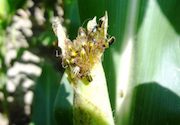| |
| |
 |
 |
| |
 |
|
August 15, 2019 |
|
| |
 At least one grain company will no longer be accepting lentils treated with glufosinate ammonium due to an inconsistency in maximum residue limits for the desiccant.
» Read more...
At least one grain company will no longer be accepting lentils treated with glufosinate ammonium due to an inconsistency in maximum residue limits for the desiccant.
» Read more...
In a survey of farm employers, from the Canadian Agricultural Human Resource Council, more than 47 per cent of respondents said they cannot not fill their labour needs. Across the sector, more than one in three responded they receive zero Canadian applicants when they post an available job.
» Read more...
The Alberta Wheat Commission, the Saskatchewan Wheat Development Commission, and the Manitoba Wheat and Barley Growers Association committed a combined $17.9 million to 81 wheat research projects during the 2018/2019 crop year.
» Read more...
|
| |
 |
 |
| |
|
| |

At Bio-Cycle Solutions, we know agriculture must be sustainable. So we are driving sustainability through innovative fertility products.
We believe innovation must lead the way in becoming a fully sustainable industry. So we create fertility solutions for long-term productivity and profitability. For over a decade, our method of managing compostable waste has reduced food waste, and returned it to farmland as nutrient rich fertilizer. We are committed to a cycle of using what we have – to make more of what we need.
We research and develop new products that support our sustainable model, through transparent processes, engagement with retailers, partners and producers. Bio-Cycle Solutions is creating the next generation of crop fertility products for farmers to deliver more food to the world.
We are driving the agriculture industry to be better prepared for the future.
» Learn more |
| |
|
| |
 A collaborative on-farm program, where growers convert lower productivity areas on their farms into bee and butterfly havens, is growing in popularity. The program’s goal is to establish a pollinator-friendly habitat and to study and learn from these sites. The project has expanded outside of Western Canada to Ontario, and producers are seeing many direct and indirect benefits.
» Learn more
A collaborative on-farm program, where growers convert lower productivity areas on their farms into bee and butterfly havens, is growing in popularity. The program’s goal is to establish a pollinator-friendly habitat and to study and learn from these sites. The project has expanded outside of Western Canada to Ontario, and producers are seeing many direct and indirect benefits.
» Learn more |
| |
 In field crops, RNAi-based biocontrols are still years from being registered for Canadian producers. But for some pests, like corn rootworm, a few years is not too long to wait for another tool in the toolbox. Corn rootworm has a history of being resistant to almost everything because of their sheer numbers, but RNAi can provide a novel mode of action against the pest.
» Learn more
In field crops, RNAi-based biocontrols are still years from being registered for Canadian producers. But for some pests, like corn rootworm, a few years is not too long to wait for another tool in the toolbox. Corn rootworm has a history of being resistant to almost everything because of their sheer numbers, but RNAi can provide a novel mode of action against the pest.
» Learn more |
| |
 |
 |
| |
|
| |
|
|
| |
| |










